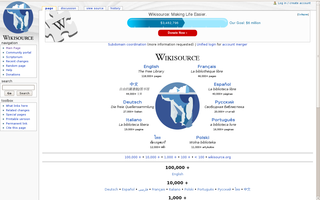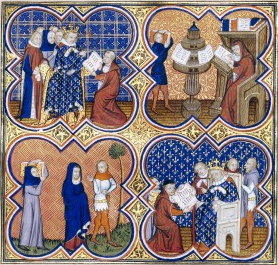Machine translation, sometimes referred to by the abbreviation MT, is a sub-field of computational linguistics that investigates the use of software to translate text or speech from one language to another.
A translation memory (TM) is a database that stores "segments", which can be sentences, paragraphs or sentence-like units that have previously been translated, in order to aid human translators. The translation memory stores the source text and its corresponding translation in language pairs called “translation units”. Individual words are handled by terminology bases and are not within the domain of TM.

In computing, internationalization and localization (American) or internationalisation and localisation, often abbreviated i18n and L10n, are means of adapting computer software to different languages, regional peculiarities and technical requirements of a target locale. Internationalization is the process of designing a software application so that it can be adapted to various languages and regions without engineering changes. Localization is the process of adapting internationalized software for a specific region or language by translating text and adding locale-specific components. Localization uses the infrastructure or flexibility provided by internationalization.

Wikisource is an online digital library of free-content textual sources on a wiki, operated by the Wikimedia Foundation. Wikisource is the name of the project as a whole and the name for each instance of that project ; multiple Wikisources make up the overall project of Wikisource. The project's aim is to host all forms of free text, in many languages, and translations. Originally conceived as an archive to store useful or important historical texts, it has expanded to become a general-content library. The project officially began on November 24, 2003 under the name Project Sourceberg, a play on the famous Project Gutenberg. The name Wikisource was adopted later that year and it received its own domain name.

IMDb is an online database of information related to films, television series, home videos, video games, and streaming content online – including cast, production crew and personal biographies, plot summaries, trivia, ratings, and fan and critical reviews. IMDb began as a fan-operated movie database on the Usenet group "rec.arts.movies" in 1990, and moved to the web in 1993. It is now owned and operated by IMDb.com, Inc., a subsidiary of Amazon.

Google Translate is a multilingual neural machine translation service developed by Google to translate text, documents and websites from one language into another. It offers a website interface, a mobile app for Android and iOS, and an API that helps developers build browser extensions and software applications. As of January 2022, Google Translate supports 109 languages at various levels and as of April 2016, claimed over 500 million total users, with more than 100 billion words translated daily.

OmegaT is a computer-assisted translation tool written in the Java programming language. It is free software originally developed by Keith Godfrey in 2000, and is currently developed by a team led by Aaron Madlon-Kay.
Various methods for the evaluation for machine translation have been employed. This article focuses on the evaluation of the output of machine translation, rather than on performance or usability evaluation.
A certified translation is one which fulfills the requirements in the country in question, enabling it to be used in formal procedures, with the translator accepting responsibility for its accuracy. These requirements vary widely from country to country. While some countries allow only state-appointed translators to produce such translations, others will accept those carried out by any competent bilingual individual. Between these two extremes are countries where a certified translation can be carried out by any professional translator with the correct credentials.

Translation is the communication of the meaning of a source-language text by means of an equivalent target-language text. The English language draws a terminological distinction between translating and interpreting ; under this distinction, translation can begin only after the appearance of writing within a language community.
Technical translation is a type of specialized translation involving the translation of documents produced by technical writers, or more specifically, texts which relate to technological subject areas or texts which deal with the practical application of scientific and technological information. While the presence of specialized terminology is a feature of technical texts, specialized terminology alone is not sufficient for classifying a text as "technical" since numerous disciplines and subjects which are not "technical" possess what can be regarded as specialized terminology. Technical translation covers the translation of many kinds of specialized texts and requires a high level of subject knowledge and mastery of the relevant terminology and writing conventions.

Wikimedia Commons is a media repository of free-use images, sounds, other media, and JSON files. It is a project of the Wikimedia Foundation.
Mobile translation is any electronic device or software application that provides audio translation. The concept includes any handheld electronic device that is specifically designed for audio translation. It also includes any machine translation service or software application for hand-held devices, including mobile telephones, Pocket PCs, and PDAs. Mobile translation provides hand-held device users with the advantage of instantaneous and non-mediated translation from one human language to another, usually against a service fee that is, nevertheless, significantly smaller than a human translator charges.

Microsoft Translator is a multilingual machine translation cloud service provided by Microsoft. Microsoft Translator is a part of Microsoft Cognitive Services and integrated across multiple consumer, developer, and enterprise products; including Bing, Microsoft Office, SharePoint, Microsoft Edge, Microsoft Lync, Yammer, Skype Translator, Visual Studio, and Microsoft Translator apps for Windows, Windows Phone, iPhone and Apple Watch, and Android phone and Android Wear.
Google Translator Toolkit was an online computer-assisted translation tool (CAT) - a web application designed to allow translators to edit the translations that Google Translate automatically generates using its own and/or user-uploaded files of appropriate glossaries and translation memory. With the Google Translator Toolkit, translators could organize their work and use shared translations, glossaries and translation memories. It allowed translators to upload and translate Microsoft Word documents, OpenDocument, RTF, HTML, text, and Wikipedia articles.
Post-editing is the process whereby humans amend machine-generated translation to achieve an acceptable final product. A person who post-edits is called a post-editor. The concept of post-editing is linked to that of pre-editing. In the process of translating a text via machine translation, best results may be gained by pre-editing the source text – for example by applying the principles of controlled language – and then post-editing the machine output. It is distinct from editing, which refers to the process of improving human generated text. Post-edited text may afterwards be revised to ensure the quality of the language choices are proofread to correct simple mistakes.

WikiBhasha is a multi-lingual content creation application for the online encyclopedia Wikipedia that must be installed in the computer.

iConji is a free pictographic communication system based on an open, visual vocabulary of characters with built-in translations for most major languages.
Mediterranean Editors and Translators (MET) is a non-profit, interdisciplinary association for language professionals who work mainly with or into English within the Mediterranean area. The association's members include translators, authors' editors, copy editors, writing and presentation coaches, teachers of academic writing, applied linguists, interpreters, professional writers and more. MET offers training workshops, an annual conference, networking and other opportunities of continuing professional development for its members. The activities of the association are guided by six objectives, summarized as follows:
- Maintain a stable network and means to hold events for English language consultants
- Communicate knowledge that can contribute to improving the quality of language support services available in the Mediterranean
- Be a conduit for exchanging information between language consultants in our geographic area and those in other parts of Europe and the world
- Stimulate research in Mediterranean communities on the needs of academics, scientists and others and on promising practices that meet their needs well
- Identify local expertise in language support and help our experts share their knowledge with a wider audience
- Help users of language support services locate appropriate solutions to their needs and promote mutual understanding between suppliers and users of these services
memoQ is a proprietary computer-assisted translation software suite which runs on Microsoft Windows operating systems. It is developed by the Hungarian software company memoQ Fordítástechnológiai Zrt., formerly Kilgray, a provider of translation management software established in 2004 and cited as one of the fastest-growing companies in the translation technology sector in 2012 and 2013. memoQ provides translation memory, terminology, machine translation integration and reference information management in desktop, client/server and web application environments.








